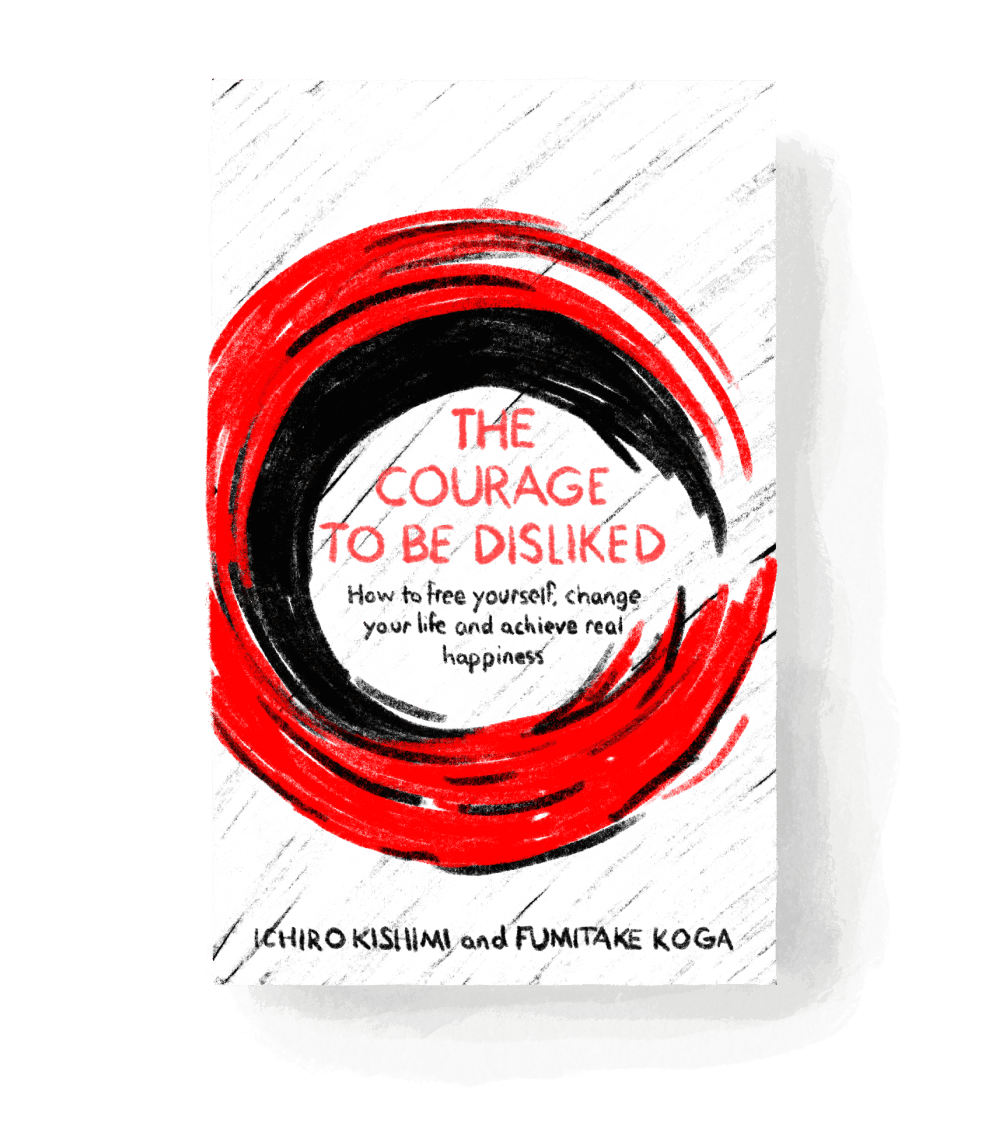All problems are derived from interpersonal relationship problems.

Book Summary of The Courage to Be Disliked
How do we live a happy life and achieve real happiness? The Courage to Be Disliked paperback has sold over 3.5 million copies, and is a Japanese phenomenon that shows how to live a life and achieve real lasting happiness. It's already an enormous bestseller and based on Alfred Adler's philosophical tenets. He believes we can all live happy and fulfilled lives without worrying about the past or future. It's also written by an award winning professional writer, Ichiro Kishimi and writer Fumitake Koga.
Throughout five nights, a young man with questions looks to get clarity from a philosopher, whose philosophies are based on the famous psychologist, Alfred Adler.
In the book, Adler's philosophy is that all problems are interpersonal relationship problems. To live a happy life, we must be able to accept ourselves as we are, and accept others as they are.
The most impactful section of the book to me was the third night—the Separation of Tasks—and you might enjoy this separate essay I wrote about it. I highly recommend this book, even if you don't agree with parts of Adlerian psychology.
Night One: Deny Trauma
The most controversial topic of the first night—and maybe the entire book—is that trauma doesn't exist.
Adler states, "No experience is in itself a cause of our success or failure. We do not suffer from the shock of our experiences—the so-called trauma—but instead, we make out of them whatever suits our purposes. We are not determined by our experiences, but the meaning we give them is self-determining."
This is clearly a tough pill to swallow, especially because of the traumatic experiences many people live through, and experience daily. Adlerian psychology seems to want to convince us that while traumatic experiences do happen, we give meaning in determining how those past experiences influence our present and future decisions.
The boy brings up an example of his friend, who has had fear and anxiety about leaving the house for the past several years. The reason he can't leave is potentially based on a traumatic experience he had with his parents as a child.
The philosopher says—based on Adlerian psychology—has created a goal not to leave the house. And he is creating fear and anxiety as his reasons to stay inside.
Night Two: All problems are interpersonal relationship problems
The second night the boy and the philosopher meet, the boy comes out and states that he dislikes himself.
This is one of the most important chapters of the book because it's something many of us struggle with. The perceptions we hold of ourselves are resolved. We notice our shortcomings because we have decided we don't like ourselves. So from that vantage point, we start to focus only on our shortcomings of ourselves and resolve to fit that narrative.
Charles Adler says that to get rid of our problems, all we can do is live in the universe all alone. Loneliness doesn't come from being all alone, but rather the feeling of exclusion of your community and the people that surround you.
Our very existence is assumed that there exist other humans. It's impossible to live without others in the world, so all the problems are interpersonal relationship problems.
Night three: Discard other people's tasks
The courage to be disliked centers on how to achieve real happiness. On the third night, the philosopher speaks about the fact that many of us desire to be loved by others.
This is the crux of the book, and what most of us struggle with. To change your life, Adlerian psychology states that we can't live trying to satisfy the expectations of others, and that we should discard the need to seek recognition from others.
By seeking recognition from others, it will lead us to follow what other people expect from us. And if we're consumed with satisfying other people's expectations, then it's going to be a very difficult life to live, constantly worried about how others see you. And in turn, how you see yourself.
The way to do this and to change your life around is to recognize the separation of tasks. This is the core theme of The Courage to Be Disliked.
The question from Adlerian psychology is to ask yourself, "Whose task is this?" Asking this will unlock the power within yourself to affect your perspective.
One of the anecdotes from the book is about a child who is having a hard time studying. Who benefits from the child studying? The parents might think it's their job to make sure they don't struggle, but it's actually the child's job. The child is dependant on the knowledge, so if the parents interfere and try to help or finish the homework, they are doing someone else's task.
In this case, this doesn't help the child, since it's their task to begin with. This doesn't mean the parents can't support or let them know they're there for him, but ultimately they can't do it for the child.
And if we look at our own tasks, we're the only ones who can affect change. No one else can, or should try to change us.
With family, we're closer to each other, and so to let people live their life and achieve real happiness, it's more important to separate out the tasks.
Night four: Where the center of the world is
In the fourth night of The Courage to be Disliked, we witness the youth struggle with the idea of loneliness stemming from the separation of tasks. If you're the only one who can change your life and achieve real happiness, then that could feel pretty lonely.
But this Japanese society phenomenon shows describes the mind and body as one, not separate. One part of the body can affect the other. The separation of tasks is a tool to discern what we're in control of, but it's the point of departure for interpersonal relations.
But the goal of interpersonal relations is "community."
The sense of belonging is something one acquires by your own efforts, but not something endowed to you at birth. It is about thinking beyond yourself, and to be of use of something larger, like the community around you, the world, and the universe.
The fifth night: To live in earnest in the here and now
Finally, we get to the last section of the book that really grabs your attention. The courage to be dislike culminates on a tenet of Adlerian psychology that states, "One must not praise, and one must not rebuke."
This is a bit difficult for me, but I can see the roots of a healthy conversation being had. The main point is that we should not be offering empty praise for someone, which starts to define a hierarchy between people. And if all problems are interpersonal relationship problems, then this can quickly create unhealthy habits and trivial pursuits of praise. The goal being to manipulate our way into favor, or to look for praise.
This is the defining aspect of the books title, The Courage to be Disliked. But not offering praise or rebuke, we are starting to define how we look at the world differently, and through a lens we're only capable of changing. Our own.
To have the courage to be disliked, we need to be able to look at others as equals, not above or below us. Redefining your hierarchy in the world has the ability to change your life for the better.
These are the theories of Alfred Adler, whether you like them or not. A contemporary of Freud and jung, I found this book enlightening and engaging at a level I didn't expect.
Favorite Quotes from the Courage to Be Disliked
“No experience is a cause of success or failure.”—Alfred Adler
“The courage to be happy also includes the courage to be disliked. When you have gained that courage, your interpersonal relationships will all at once change into things of lightness.”
“Your unhappiness cannot be blamed on your past or your environment. And it isn’t that you lack competence. You just lack courage. One might say you are lacking in the courage to be happy.”
“Do not live to satisfy the expectations of others”
“No experience is in itself a cause of our success or failure. We do not suffer from the shock of our experiences—the so-called trauma—but instead we make out of them whatever suits our purposes. We are not determined by our experiences, but the meaning we give them is self-determining.”
Book Notes of The Courage to Be Disliked
At present, the world seems complicated and mysterious to you, but if you change, the world will appear to have a more simple and straightforward answer. The issue is not about how the world is, but about how you are.
In Adlerian psychology, we do not think about past “causes” but rather about present “goals.”
Your friend is insecure, so he can’t go out. Think about it the other way around. He doesn’t want to go out, so he’s creating a state of anxiety.
Your friend had the goal of not going out beforehand, and he’s been manufacturing a state of anxiety and fear as a means to achieve that goal. In Adlerian psychology, this is called “Teleology.”
This is the difference between Etiology (the study of causation) and Teleology (the study of the purpose of a given phenomenon, rather than its cause).
As long as we stay in Etiology, we will not take a single step forward.
And isn't this what being a human being is all about?
Freud’s idea is that a person’s psychic wounds (traumas) cause his or her present unhappiness.
If we only focus on the cause of our problems, or what happened to us to put us in this spot, we will not move forward becasue we're only focusing on the past.
“No experience is in itself a cause of our success or failure. We do not suffer from the shock of our experiences—the so-called trauma—but instead we make out of them whatever suits our purposes. We are not determined by our experiences, but the meaning we give them is self-determining.”
We determine our own lives according to the meaning we give to those past experiences. Your life is not something that someone gives you, but something you choose yourself, and you are the one who decides how you live.
Every one of us is living in line with some goal. That is what Teleology tells us.
In a word, anger is a tool that can be taken out as needed. It can be put away the moment the phone rings, and pulled out again after one hangs.
“People are not driven by past causes but move toward goals that they themselves set”—that
Take Socrates, who left not one book actually written by himself. He spent his days having public debates with the citizens of Athens, especially the young, and it was his disciple, Plato, who put his philosophy into writing for future generations.
“The important thing is not what one is born with but what use one makes of that equipment.” You want to be Y or someone else because you are utterly focused on what you were born with. Instead, you’ve got to focus on what you can make of your equipment.
At some stage in your life, you chose “being unhappy.” It is not because you were born into unhappy circumstances or ended up in an unhappy situation. It’s that you judged “being unhappy” to be good for you.
When we try to change our lifestyles, we put our great courage to the test. There is the anxiety generated by changing, and the disappointment attendant to not changing.
Yes. Adlerian psychology is a psychology of courage. Your unhappiness cannot be blamed on your past or your environment. And it isn’t that you lack competence. You just lack courage. One might say you are lacking in the courage to be happy.
And this might lead to a happy and fulfilled life
not being criticized. Rather, as Adler’s [[Teleology]] tells us, “No matter what has occurred in your life up to this point, it should have no bearing at all on how you live from now on.” That you, living in the here and now, are the one who determines your own life.
Loneliness is having other people and society and community around you, and having a deep sense of being excluded from them.
Those who manifest their inferiority complexes in words or attitudes, who say that “A is the situation, so B cannot be done,” are implying that if only it were not for A, they’d be capable and have value.
If one really has confidence in oneself, one doesn’t feel the need to boast. It’s because one’s feeling of inferiority is strong that one boasts. One feels the need to flaunt one’s superiority all the more. There’s the fear that if one doesn’t do that, not a single person will accept one “the way I am.” This is a full-blown superiority complex.
If there is competition at the core of a person’s interpersonal relationships, he will not be able to escape interpersonal relationship problems or escape misfortune.
The reason so many people don’t really feel happy while they’re building up their success in the eyes of society is that they are living in competition. Because to them, the world is a perilous place that is overflowing with enemies.
If, for example, the main point of your job turns out to be satisfying other people’s expectations, then that job is going to be very hard on you. Because you’ll always be worried about other people looking at you and fear their judgment, and you are repressing your “I-ness.”
Studying is the child’s task. A parent’s handling of that by commanding the child to study is, in effect, an act of intruding on another person’s task. One is unlikely to avert a collision in this way. We need to think with the perspective of “Whose task is this?” and continually separate one’s own tasks from other people’s tasks.
YOUTH: How does one go about separating them? PHILOSOPHER: One does not intrude on other people’s tasks. That’s all.
In general, all interpersonal relationship troubles are caused by intruding on other people’s tasks, or having one’s own tasks intruded on. Carrying out the separation of tasks is enough to change one’s interpersonal relationships dramatically.
There is a simple way to tell whose task it is. Think, Who ultimately is going to receive the result brought about by the choice that is made?
It’s true that one often hears parents today using the phrase “It’s for your own good.” But they are clearly doing so in order to fulfill their own goals, which could be their appearance in the eyes of society, their need to put on airs, or their desire for control, for example. In other words, it is not “for your own good” but for the parents’. And it is because the child senses this deception that he rebels.
In Adlerian psychology counseling, for instance, we do not think of the client’s changing or not changing as the task of the counselor.
Then, suppose your own child had shut himself in, what would you do? Please answer this not as a philosopher but as a parent. PHILOSOPHER: First, I myself would think, This is the child’s task. I would try not to intervene in his shut-in situation, and I would refrain from focusing too much attention on it. Then I would send a message to him to the effect that I am ready to assist him whenever he is in need. In that way, the child, having sensed a change in his parent, will have no choice but to make it his own task to think about what he should do. He’ll probably come and ask for assistance, and he’ll probably try to work some things out on his own.




